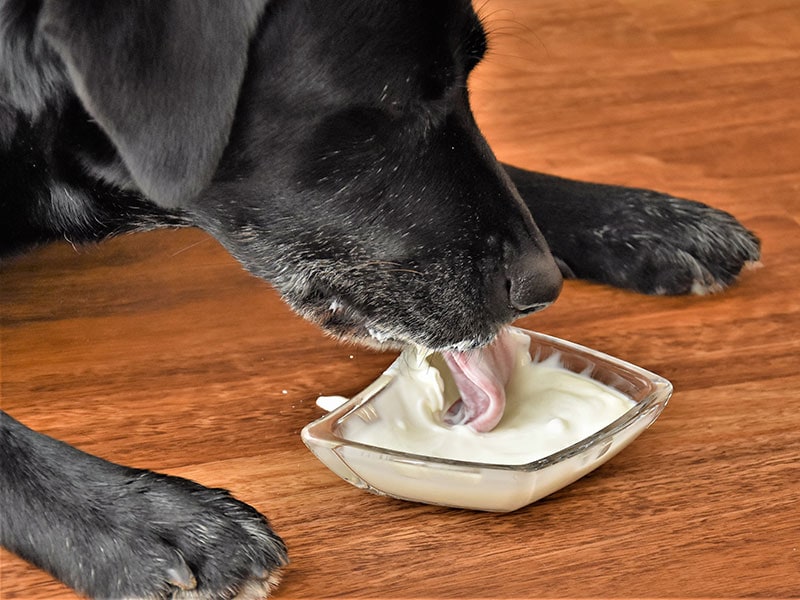Can Dogs Eat Yogurt? A Guide Dog Parents Cannot Miss In 2023
Most pet parents have wondered whether dogs can eat yogurt since dogs seem to enjoy licking it off or whether they are just curious. Apples, white rice, or even popcorn are some of the human foods you can share with your dog – dogs are omnivores, after all. (6)
They are not picky eaters.
What about yogurt? Is yogurt a good idea to treat your dog after it has learned a new trick? If consumed to excess, will there be any problems? Save your questions; this post will provide you with everything you need to know concerning your dog’s health if it has licked some yogurt by chance.
Don’t waste your time. Let’s scroll down and find the answers!
Is It Okay For Dogs To Lick Some Yogurt?
Overall, yogurt provides your dog with many nutrients. Most dogs can eat yogurt, so long as they are not lactose intolerant or you don’t overfeed them. The best kinds of yogurt for dogs are plain yogurt, Greek yogurt, and kefir. Avoid other types that contain sweeteners or preservatives.
Some Facts About Yogurt
What else do you know about yogurt besides the fact that it’s a lip-smacking treat that cools you off? Here are some basic facts about yogurt that you may be interested to learn.
How Yogurt Is Made
Yogurt is made from cow’s milk and fermented with two types of yogurt culture, Lactobacillus delbrueckii subsp. bulgaricus and Streptococcus thermophilus. (2), (3) These two cultures are responsible for breaking down lactose into lactic acid. Thanks to this organic acid, yogurt has a deliciously tangy flavor that you can’t resist – and your dogs agree, too!
Yogurt comes in many flavors, from the plain to a variety of fruity ones. Most types of yogurt contain sugar, artificial sweeteners, or even food additives. You can easily find the nutritional value of yogurt on its label.
Nutrition Content Of Yogurt
Undoubtedly, yogurt is the embodiment of taste and health – it is loaded with many nutrients that benefit your dog’s overall health. Yogurt is rich in protein, which ends your hunger pangs and maintains your weight. Yogurt is also packed with a lot of minerals, vitamins, and calcium that benefit your health.
Furthermore, probiotics in yogurt are proven to regulate your digestive system, minimizing the risk of gas, diarrhea, and constipation. They also play a crucial role in boosting your immune system and reducing the risk of critical illnesses.
Health Benefits Of Yogurt For Dogs
Don’t worry if your playful pups have just licked some leftover yogurt on the table. Surprisingly, in small quantities, yogurt is an excellent nutrient source for dogs. What exactly does your dog gain in a spoonful of yogurt?
Probiotics
Probiotics are the live microorganisms added during the manufacturing process of yogurt. They provide tremendous benefits for both humans and their dogs. Probiotics are proven to help your dog digest food more easily; plus, they facilitate the absorption of several vitamins and minerals, strengthening your dog’s immune system.
Some other advantages of consuming these healthy bacteria include regulating bowel movement, reducing intestinal gas, and lessening the risks of diseases and other disorders. It is indeed a panacea for your adorable dogs and puppies.
Protein
Protein plays a crucial role in regulating dogs’ bodily processes. Once broken down, proteins turn into smaller chains of amino acids. These organic compounds help build your dog’s hair, skin, nails, muscles, and several other parts of its body.
In addition, protein also strengthens your dog’s immune system. What’s more? Proteins are responsible for creating antibodies, enzymes, and hormones.
Calcium
Calcium is another macronutrient that dogs can get from yogurt to support their bone and teeth health. Other benefits of calcium for a dog’s overall health include better digestion, transmitting hormones, promoting a healthy nerve system, and helping blood clot.
Potassium
Potassium is an electrolyte that must be included in your dog’s diet. (7) This mineral facilitates the absorption of other nutrients and maintains the condition of body organs. At the same time, potassium boosts your dog’s cognitive function – it will become smarter! If your dog lacks potassium, it will become sluggish, less active, and lose its appetite.
Magnesium
Yogurt is an excellent source of magnesium, a nutrient that helps maintain dogs’ blood sugar. Magnesium also plays a vital role in detoxification and reduces stress and the risk of seizures. However, a high intake of magnesium can be harmful, which can lead to cardiac problems or kidney failure. (5)
Vitamins
Dogs need vitamins, too, just like their owners. A spoon of yogurt can supplement dogs with many vitamins, namely B12 or phosphorus. While the former helps regulate enzyme function, the latter vitamin is essential for healthy bone growth.
Treating Infections
A few spoons of yogurt is a cure-all to yeast and ear infections, two common conditions that happen to many dogs. All you have to do is mix yogurt with vinegar, then use the solution to flush dogs’ ears or spray on their skins, and the yeast will be eradicated. Consult your vet before doing this at home to make sure that you are doing no harm to your furry friends.
Best Kinds Of Yogurt For Dogs
What types of yogurt are the healthiest for dogs? Unless your dogs are lactose intolerant, the following yogurts are the best options that your dogs will definitely give their paws up.
Plain Yogurt
Regular plain yogurt is the safest choice for your four-legged buddies; it usually contains no sweeteners or preservatives, which are not suitable for dogs. Probiotic content found in plain yogurt can improve your dog’s gut health, while other nutrients such as calcium and protein do an excellent job in supporting bones and muscles.
Plain yogurt is relatively simple to make, so show your dog some love with some home-made yogurt.
Greek Yogurt
However, Greek yogurt can be a lot thicker because it is trained, which may not be suitable for small dogs. Plus, its flavor is tangier than the regular kind, so it can be an acquired taste for your dogs.
Kefir
Like other fermented dairy products, kefir contains probiotics that improve coat appearance, reduce allergies, and mitigate the negative effects of antibiotics. Kefir is also packed with vitamin A, B, D, K, calcium, and magnesium – the essential nutrients that your dog needs.
So, what yogurts can’t dogs eat? Avoid feeding your dogs any kind that contains too many sugars, sweeteners, or preservatives – they are detrimental to your dog’s health. Read the nutrition label carefully before making a purchase; that’s my advice.
You can see this video to know more:
How Much Yogurt Should Dogs Eat (Without Falling Ill)?
And now, here goes the tricky part: how much yogurt should you give your dog? There is no definite answer, as you have to consider the following factors to decide the appropriate amount.
Size And Weight
If your puppy is rather small and lightweight, give it from one to two tablespoons. If your dog is a big boy, three tablespoons should be fine.
Daily Calorie Intake
It is advisable that dogs need 350 calories per day to control their weight, and the amount of yogurt you feed yours should account for 10% of its daily calorie intake. (1)
Health Problems
Some dogs are lactose intolerant. If your dog is one of them, check the nutrition label before feeding it yogurt. Unlike cats, lactose intolerance in dogs is not too severe. Your canines can lap up yogurt without showing worrying side effects.
If it’s all rocket science to you, consult your vet, or remember the general rule: one to two tablespoons of yogurt is enough to keep your dogs healthy. So, what happens when your dogs crave more? Even if your dog gives you puppy eyes, you should not let him have more – its health will become worse.
Signs That Your Dogs Are Lactose Intolerant
When it comes to human foods, some dogs are quite sensitive, and they will develop symptoms that make pet parents get into a lather. If your dog displays one of the symptoms listed below, the chances are that it is lactose intolerant, which means yogurt is a definite no-no.
Diarrhea
Diarrhea is the very first sign you can tell that your dog has savored some yogurt. You may want to check its feces to see if there’s anything unusual. For example, if it’s not firm, your dog is having a hard time excreting the waste.
Vomiting
Did your dog throw up? If it did, your dog is trying to tell you that it’s allergic to yogurt. Vomiting is the result of the changes that happen to your dog’s gut when ingesting dairy products. Dogs usually drool or lick surfaces excessively before they vomit, so watch out to make sure that they don’t make a mess.
Loss Of Appetite
Yogurt can also cause dogs to lose their appetite. If your dog refuses to eat for quite a long time, bring it to the nearest vet for a medical check.
Bloating
Another sign of lactose intolerance in dogs is that they release too much gas than usual – your dog is feeling bloated.
Flatulence
Yes, it’s your dog’s smelly farts! They are less funny when you find out that it’s one of the symptoms of lactose intolerance (and the least severe).
FAQs
Maybe you (or your dogs) still have some questions to ask? The following section has all the answers to your further questions, so don’t skip it!
An Extra Tip For Your Man’s Best Friend
Some dogs don’t like yogurt initially, but it will grow on them. It’s important that you introduce yogurt to your dog step by step. You can start by giving it small dabs in a teaspoon to see if it enjoys the taste. You can serve some yogurt on top of its food, too. For those that are stubborn, yogurt can also help trick your dogs into taking medication.
That’s all you ever need to know about feeding yogurt to your dogs. Dog parents, if I missed any important point, let me know by commenting right down below. There’s nothing happier than seeing these furry pals enjoying their food and being healthy!
References
1. Association for Pet Obesity Prevention. 2021. Pet Caloric Needs — Association for Pet Obesity Prevention.
2. En.wikipedia.org. 2021. Lactobacillus delbrueckii subsp. bulgaricus – Wikipedia.
3. En.wikipedia.org. 2021. Streptococcus thermophilus – Wikipedia.
4. En.wikipedia.org. 2021. Xylitol – Wikipedia.
5. Vetbook.org. 2021. Hypermagnesemia – Dog.
6. Purina.com. 2021. Are Dogs Omnivores or Carnivores?
7. Wellness, P., 2021. 3 Easy Ways to Add Potassium to Your Dog’s Diet | ParsleyPet Wellness.

